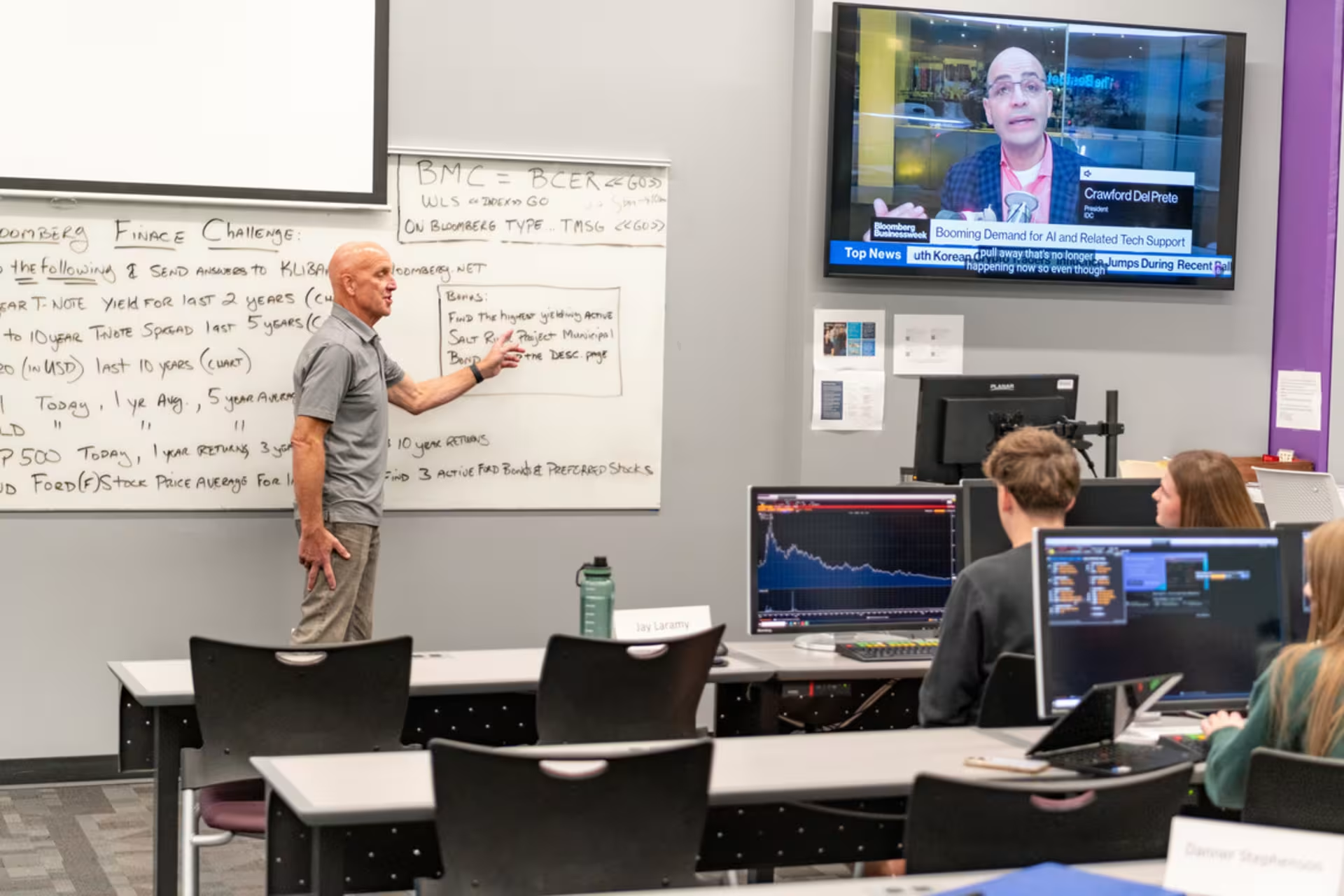
Bachelor of Science (BS) in Finance Degree
Build Foundational Knowledge in Financial Management
A Bachelor of Science (BS) in Finance degree from Grand Canyon University can help prepare you to pursue opportunities in the financial world. As a finance major, you will be taught about financial industries, including financial services, wealth management, corporate finance, insurance and real estate.
You will also consider how to analyze data and information related to money management. Integrate your understanding of global financial markets with informed decision-making for everyone, from individual clients to major corporations.
Median annual wage of financial analysts as of May 2024(See disclaimer 1)
Up to 90 credits, only 84 can be lower division
Credits: Fill out the Lopes Eval to find out what will transfer
Admission Requirements (Bachelor's)
- 16+ years old
- High School Graduate
- 3.0+ Unweighted GPA
OR 2.5+ Unweighted GPA and
- ACT: 19
- SAT: 1000*
Admission requirements may differ based on degree level, program and modality, or transfer status. Some programs of study may require a higher GPA and/or other qualifying criteria for admission. Please review full admission and program requirements in the University Policy Handbook.
*Math and reading only on a 1600 point scale (test date after 3/1/2016). SAT score of 1380 required for 2400 point scale (test date before 3/1/2016).
Shape Your Future in Finance at GCU
We are committed to making higher education more accessible to everyone. At GCU, you can earn your finance bachelor’s degree online or on campus. Online degree programs include a variety of online learning resources and support to help you complete your degree in a flexible and convenient format.
We strive to graduate students who emerge ready to make a positive impact on their organizations and the broader community. As a Christian university, our curriculum emphasizes professional ethics, personal integrity and servant leadership. In addition to these principles, our degree program provides a strong foundation in competencies to help prepare you for a range of finance-related careers. If you would like to concentrate your studies on a specific area, consider enrolling in the financial planning emphasis program.

Core Topics Driving the BS in Finance
Careers in finance help businesses run successfully. To prepare for these business-related careers, finance majors study topics related to money management, such as investments, portfolio management, risks assessments and financial markets and institutions. This degree program also covers principles of microeconomics, business statistics and organizational behavior. In addition to technical skills, students are guided to develop strong communication, critical thinking, information literacy and research skills.

Core Business Domains
As with all degrees offered by the Colangelo College of Business, the BS in Finance is grounded in core business domains. These domains are intended to help you become a well-rounded, ethical practitioner.
The financial degree program courses focus on:
Investment strategies
Modern monetary systems
Capital markets
Budget and accounting report analysis
Financial proposals
Credit reporting and money lending
Risks and mitigation strategies
Real estate proposals and financing options
Career Opportunities With an Undergraduate Finance Degree
Finance professionals are needed across various sectors, including healthcare, higher education, charitable organizations and government agencies. Employers include corporations, accounting firms, brokerage houses and financial services companies of all sizes.(See disclaimer 2)
A Bachelor of Science in Finance degree can equip students to confidently contribute to several industries, including wealth management and banking, real estate, corporate finance, risk management and insurance, international finance, and economics.
Graduates with a BS Finance degree may pursue various positions based on their interests, including:
Financial analyst
Investment analyst
Loan officer
General and operations manager
Financial manager
Budget analyst
Frequently Asked Questions
If you’re considering earning your finance bachelor's degree, check out our frequently asked questions and answers to learn more.
Can you get a finance bachelor’s degree online?
What jobs can you get with a BS in Finance?
Program Curriculum
General Education Requirements
Core Courses

Finance professionals can make a lasting impact on individuals and organizations. Discover how GCU’s Bachelor of Science in Finance can help you build the skills to do the same.
- The earnings referenced were reported by the U.S. Bureau of Labor Statistics (BLS), Financial Analysts as of May 2024, retrieved October 2025. Due to COVID-19, data from 2020 to 2023 may be atypical compared to prior years. BLS calculates the median using salaries of workers nationwide with varying levels of education and experience. It does not reflect the earnings of GCU graduates as personal financial advisors, nor does it reflect the earnings of workers in one city or region of the country or a typical entry-level salary. Median income is the statistical midpoint for the range of salaries in a specific occupation. It is very unlikely that a median salary will reflect an entry-level salary. It represents what you would earn if you were paid more money than half the workers in an occupation, and less than half the workers in an occupation. It may give you a basis to estimate what you might earn at some point if you enter this career. Grand Canyon University can make no guarantees on individual graduates’ salaries. Your employability will be determined by numerous factors over which GCU has no control, such as the employer the graduate chooses to apply to, the graduate’s experience level, individual characteristics, skills, etc. against a pool of candidates.
- Nemeroff, B. (n.d.). Top 10 Jobs for Finance Majors and Who’s Hiring. Handshake. Retrieved October 2025.


